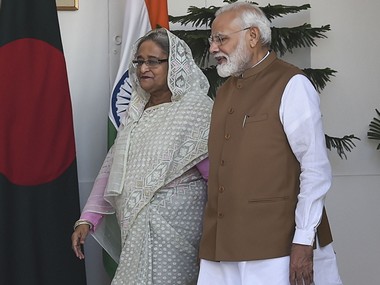“We don’t understand why [Government of India] did it,” said Bangladesh prime minister Sheikh Hasina in an interview published by Gulf News on Saturday, “It was not necessary.” The Citizenship Amendment Act, 2019 — signed into law on
11 December last year — and the proposed National Register of Citizens, have been seen by many as targeting illegal immigrants specifically from India’s neighbour to the East. And thus far, the Bangladesh government has been largely balanced in its observations about both. In her
interview to
Gulf News, Hasina reiterated the country’s hitherto-held position that “Bangladesh has always maintained that the CAA and NRC are internal matters of India”. She went on to add that the Indian government has also ‘repeatedly maintained’ that it is an internal exercise and that she was given personal assurances to that effect by Prime Minister Narendra Modi during her India visit in October last year. The topic of the then-Citizenship Amendment Bill was also discussed by the two South Asian prime ministers at a meeting on the sidelines of the UN General Assembly in New York in a month prior. [caption id=“attachment_7464911” align=“alignleft” width=“380”] File image of Narendra and Sheikh Hasina. PTI[/caption] Notably, the
joint statement issued by Modi and Hasina following their October meet contained no mention of any discussion or understanding on the then-bill or NRC. However, it did touch upon a whole host of other issues that form the gamut of bilateral relations, including the simplification of travel requirements and the phasing-out of entry-exit restrictions for Bangladeshi citizens with valid travel documents. While exchanges between India and Bangladesh have maintained the tone of reassurance — from New Delhi — and respect for sovereignty — from Dhaka, it is the remarks and action from those in the Hasina government that have reflected the local unease caused by the CAA and NRC. Shortly after the passage of the CAB into law,
emerged reports that Foreign Minister AK Abdul Momen and Home Minister Asaduzzaman Khan had cancelled their respective visits to India. Both would, however, go on to clarify that their decisions to call off their respective visits were unrelated to the CAA, but due to domestic commitments. On 12 December, following reports of CAA-related vandalism near Bangladesh’s Assistant High Commission in Guwahati, the country
beefed up security at the premises and lodged a complaint with India. A couple of days later, Hasina’s media advisor Iqbal Sobhan Chowdhury
told India Today that despite the CAA being India’s internal matter, “[if] any domestic issue can create concerns in Bangladesh, then we have reasons to be apprehensive.” He went on to register his displeasure at being lumped with Pakistan and Afghanistan — the two other countries, under the CAA, whose oppressed non-Muslim émigrés living in India can apply for citizenship. “Do not club us with Pakistan and Afghanistan who are known for fundamentalism and terrorism,” said Chowdhury, noting Hasina’s vow that Bangladeshi soil “will not be allowed to be used against India”. The great balance Coming back to Hasina’s interview to Gulf News, her remarks do not represent a major shift from the country’s firmly-held position of the CAA and NRC being ‘India’s internal matter’. By expressing her view that she didn’t understand why India embarked on such a move and opining that it wasn’t ’necessary’, the Bangladeshi prime minister appears to be smartly balancing three sets of audiences. The first is the home audience that is restless about the implications of the CAA and NRC on Bangladeshis and their relatives in India. Hasina will have felt the need to assuage concerns in Bangladesh that their prime minister is dancing to India’s tune to the detriment of her own people. These remarks will have helped establish that no matter the importance of the bilateral to Hasina, the well-being of her people comes first. The second audience is the one in India, particularly in New Delhi. Bangladesh and India are arguably each other’s most important partners in South Asia and Hasina will have only been too acutely aware of this reality. It is likely then that the wording of her remarks — which eschew what India ‘must’ or ‘should’ do and instead focus on her own understanding of the issue — will have been engineered to keep India’s sensitivities in mind and not rock the boat too much. The third audience is in Beijing. In October 2016 during President Xi Jinping’s visit to Bangladesh, China earmarked a $20-billion loan package for around 27 infrastructure and development projects across the country. Dhaka, which was initially reticent about the Middle Kingdom’s ‘Belt Road Initiative’, is now a lot more open to the idea. Hasina has long given the impression through her remarks and actions that she is vehemently pro-India — even going as far as to state that the abrogation of Article 370 in Jammu and Kashmir was India’s internal matter, amidst Beijing’s efforts to haul New Delhi over the coals in the UN over Kashmir. Hasina has long maintained that Bangladesh seeks amicable ties with all its neighbours (near and far) and her statements thus far have been in line with that policy. How the three sets of stakeholders respond to her latest remarks remains to be seen.
“We don’t understand why [Government of India] did it,’ said Bangladesh prime minister Sheikh Hasina in an interview published by Gulf News on Saturday, ‘It was not necessary.’
Advertisement
End of Article


)

)
)
)
)
)
)
)
)



